Why has the DAA board fallen out with chief executive Kenny Jacobs?
Listen | 37:45

Read more on post.
Federal Reserve chair Jerome Powell pushed back on expectations of more interest rate cuts in the coming months, saying policymakers faced a “challenging situation” in deciding whether to prioritise fighting inflation or protecting jobs.
The Fed last week cut borrowing costs by a quarter-point to a range of 4 per cent to 4.25 per cent amid signs of weakness in the labour market and data showing the impact of tariffs on price pressures remained modest.
Many investors are banking on another two quarter-point cuts before the end of 2025. But Mr Powell on Tuesday signalled those moves were far from a done deal, saying if central bankers “ease too aggressively”, then they “could leave the inflation job unfinished and need to reverse course” to restore price increases to their two per cent goal.
Inflation has been above the central bank’s target since 2021 and is expected to rise further as President Donald Trump’s tariffs push up prices for US shoppers.
However, Mr Powell also warned keeping rates “restrictive” for too long meant “the labour market could soften unnecessarily”.
“Near-term risks to inflation are tilted to the upside and risks to employment to the downside – a challenging situation,” he said in prepared remarks for a speech in Rhode Island. “When our goals are in tension like this, our framework calls for us to balance both sides of our dual mandate.”
[ US Fed interest-rate cut unlikely to go far enough for TrumpOpens in new window ]
US stocks slipped on Tuesday, led by a decline in tech companies that gave back some of the previous session’s gains.
The tech-heavy Nasdaq Composite fell 0.9 per cent, with Nvidia down 2.8 per cent and Oracle losing 4.4 per cent. The blue-chip S&P 500 dipped 0.5 per cent.
Mr Powell said most of the cost of tariffs had been shouldered by US businesses and not – as the White House has claimed – foreign companies.
Listen | 37:45
“We’re collecting a good chunk of revenue, we’ve got a $300 billion-a-year pace (€255 billion). The question is who’s paying for that?” he said in a response to questions. “It’s incredibly early days, but it doesn’t look like overseas exporters are carrying the bulk of it. It looks like it’s … retailers and it’s importers. And they’re not passing along to consumers that much of the cost.”
The Fed’s latest cut – the first since December – came during fierce pressure from US President Donald Trump, who has labelled Powell a “numbskull” for keeping borrowing costs on hold.
Mr Powell said the worsening of conditions in the labour market signalled to rate-setters that their “stance of having a really tight focus on inflation really needs to moderate towards a more balanced approach”.
US borrowing costs remain restrictive, constraining inflation but weighing on growth too, the Fed chair added in his prepared remarks.
While 10 members of the rate-setting Federal Open Market Committee (FOMC) backed a quarter-point cut, Stephen Miran, a Mr Trump ally who joined the Fed’s board on the morning of last week’s meeting, backed a bigger half-point move. The FOMC has 19 members but only 12 are able to vote at any one time.
While a narrow majority of 10 on the FOMC support two or more cuts by the end of the year, a sizeable minority of seven want no cuts at all, or for rates to rise. – Copyright The Financial Times Limited 2025
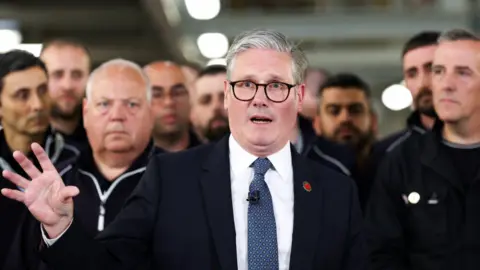
Read more on post.
Simon JackBusiness editor and
Chris MasonPolitical editor
The government is looking at ways to financially support the companies in Jaguar Land Rover’s (JLR) supply chain.
JLR halted car production at the end of August after a cyber attack forced it to shut down its IT networks. Its factories remain suspended until next month at the earliest.
Fears are growing that some suppliers, in particular the smaller firms who solely rely on JLR’s business, could go bust without support.
One idea being explored is the government buying the component parts the suppliers build, to keep them in business until JLR’s production lines are up and running again.
Unions had called for a Covid-style furlough scheme, but ministers have ruled this out given its likely cost, sources have told the BBC.
Another option being considered is providing government-backed loans to suppliers, though this is understood to be out unpopular with suppliers.
The purchase and stockpiling of car parts by the government is also an option on the table, but this would present considerable logistical challenges.
JLR’s manufacturing process relies on the right part arriving at the right place, at the right time.
However, industry experts agree doing nothing risks firms in the supply chain, which employs tens of thousands of workers, facing bankruptcy.
The Business and Trade Select Committee is due to meet on Thursday afternoon to hear testimonies from businesses in JLR’s supply chain because of deep concern for some of these businesses to remain viable.
This evidence will be shared with the government afterwards.
Senior government figures are concerned about a pattern of cyber attacks on UK institutions and businesses, such as the British Library, Marks & Spencer, and the Co-op.
A group calling itself Scattered Lapsus$ Hunters has claimed responsibility for the hack on JLR, Marks & Spencer, and Co-op.
An investigation is under way into the cyber attack on JLR, which is believed to be costing the company at least £50m a week in lost production.
JLR would normally expect to build more than 1,000 cars a day at its three factories in Solihull and Wolverhampton in West Midlands and Halewood in Merseyside.
However, workers were sent home following the hack – which first came to light on 1 September – with no firm return date.
About 30,000 people are directly employed at those plants with a further 100,000 working in the firm’s supply chain.
On Tuesday, the business secretary and industry minister visited the West Midlands for the first time since the incident to meet JLR and the firms in its supply chain.
The Department for Business and Trade said ministers have discussed “the impacts of the cyber incident and how JLR can work towards restarting production”.
Additional reporting by Pritti Mistry

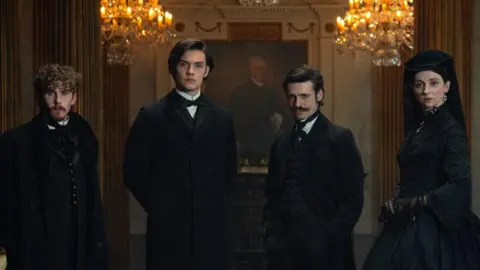
Read full article on post.
Yasmin RufoBBC News
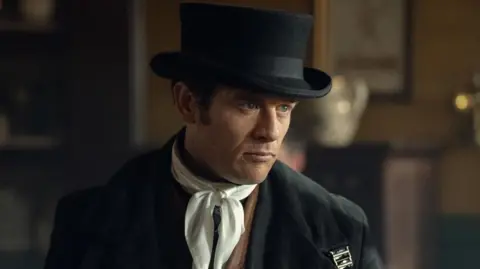 Netflix
NetflixTaking family power struggles and turning them into global television sensations is becoming something of a habit for screenwriter Steven Knight.
With Peaky Blinders, he took a Birmingham street gang and made them a cultural force. Now, Knight is betting on another dynasty, one rooted in brewing, wealth and legacy.
House of Guinness, which launches on Netflix on Thursday, tells the story of Ireland’s most famous family name at the moment of crisis – Sir Benjamin Guinness has died and his four children, each concealing dark secrets, are left to steer the brewery’s fate.
Knight says when he looked into the real-life Guinness family, “it was immediate that I realised this is an incredible drama and story”.
He was struck by “the characters, events and how it all intermeshed with history and what was going on at the time”.
While the story is based on real events, it is a drama first and foremost. Fact and fiction have been blended together, but Knight says he doesn’t see those two things as mutually exclusive, as “it’s often the true events that are the least believable”.
“Some of the historical events are so amazing and unexpected you wouldn’t make them up yourself,” he tells the BBC.
One of the imagined figures in the Netflix drama is Sean Rafferty, the brewery’s foreman, played by Happy Valley star James Norton, whose fate becomes entangled with the dynasty’s power struggles.
Norton says his character is an “amalgamation of lots of different people” who existed at the time, adding that he found researching into the history of Guinness “remarkable and fascinating”.
The 40-year-old explains that as soon as he read the script he was ready to sign up to the show.
“I read the first four scripts all at once and it was a no-brainer,” he says. “Almost every scene starts with Rafferty’s silhouette in a window in a cloud of smoke and I thought ‘sign me up, that’s really cool’.”
Most of the actors in the series were Irish, something Norton says added a level of pressure when it came to perfecting the accent and admits he was “so scared on the first day”.
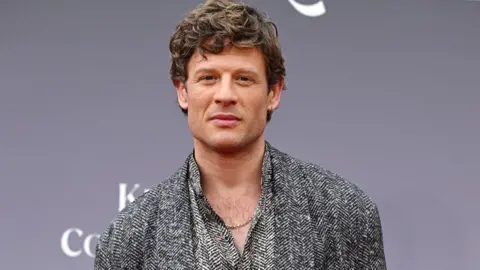 Getty Images
Getty Images“You work really hard at the beginning and once you crack the first big dialogue scene and have spoken the first lines there’s no going back,” he explains.
The first scene Norton filmed was one where he punches three disloyal workers at the Guinness factory. He says he used the line ‘I see your three names written in black ash up there’ to get back into the accent for subsequent scenes.
Starring alongside Norton is Irish actress Danielle Galligan who plays Lady Olivia, an aristocrat who marries into the Guinness family. After the British monarch, she was the richest woman in Britain and Ireland at the time.
The actress says she loved researching her character and understanding what she was really like.
“She’s such a firecracker in the series and then I actually found out she was also a very solitary and silent woman who painted lots of watercolours,” Galligan explains.
“She was a woman who had everything and yet was still looking for something. Learning about her gave me a sense of her lack of fulfilment and added another layer to her.”
Galligan says it was very special to tell an Irish story and “to do it on a global scale is a once-in-a-lifetime kind of experience”.
Joining Galligan is Niamh McCormack, whose character is part of the rebellious Fenian Brotherhood, and Jack Gleeson, who is best known for playing Joffrey Baratheon in Game of Thrones.
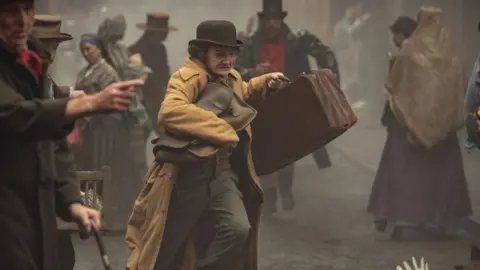 Netflix
NetflixMcCormack and Gleeson say they are proud to be part of a series that puts Ireland on the map, but admit that with pride comes pressure over how it will be received by audiences at home.
“It’s always a factor but I tried not to think about it too much,” Gleeson says. “You want things to be represented well but also hopefully people know not to take it too seriously as a historical document.”
Knight was less worried about what audiences would think, admitting: “I should care but I don’t – if you worry what people are going to think you can’t really do anything as you’d be trying to please too many different people.”
House of Guinness has already been compared to the likes of Succession, The Crown and Peaky Blinders but Knight is indifferent about how people compare it.
“People say every project is a cross between stuff and I don’t take that too seriously, I’m confident that this is its own thing,” he says.
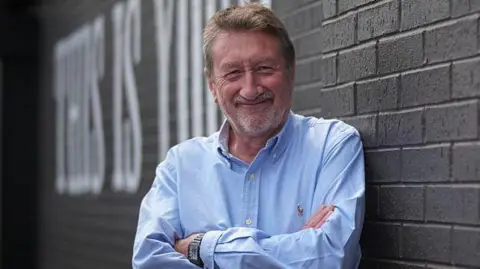 Getty Images
Getty ImagesFor Norton, who is also currently starring in BBC’s historical drama King & Conqueror, to be compared to such successful shows is a positive.
“To be in the same breath as those dynasty shows is great and I’m happy if we’re included among that group,” he says. Gleeson agrees and explains that this drama “takes the best bits of the rest and adds its own magic and essence”.
Knight does admit that there are many similarities between House of Guinness and Peaky Blinders and the shows have influenced each other as the 66-year-old has recently finished working on the Peaky Blinder film, The Immortal Man, which will see Cillian Murphy reprise his role as Birmingham gangster Tommy Shelby.
“Sometimes parallels are pointed out that I don’t even have a clue about,” he laughs. “But there are a lot of similarities – the family, it has the same energy, humour and swagger.”
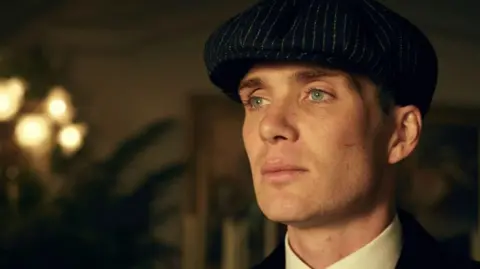 BBC Studios
BBC StudiosKnight is also involved in writing the new James Bond film, which he previously told the BBC had always been on his bucket list.
The movie will be directed by Dune’s Denis Villeneuve and is currently in development and being overseen by Amazon MGM Studios after long-serving masterminds Barbara Broccoli and Michael G Wilson stood down in February.
When asked a question about Bond, Knight smiles and says he’s not able to talk about it but does admit that after the success of several of his shows, he feels a greater freedom to write more creatively.
And with House of Guinness, he hopes to have used that freedom to make this latest dynasty saga a success in its own right.

Read more on post.
Yasmin RufoBBC News
 Netflix
NetflixTaking family power struggles and turning them into global television sensations is becoming something of a habit for screenwriter Steven Knight.
With Peaky Blinders, he took a Birmingham street gang and made them a cultural force. Now, Knight is betting on another dynasty, one rooted in brewing, wealth and legacy.
House of Guinness, which launches on Netflix on Thursday, tells the story of Ireland’s most famous family name at the moment of crisis – Sir Benjamin Guinness has died and his four children, each concealing dark secrets, are left to steer the brewery’s fate.
Knight says when he looked into the real-life Guinness family, “it was immediate that I realised this is an incredible drama and story”.
He was struck by “the characters, events and how it all intermeshed with history and what was going on at the time”.
While the story is based on real events, it is a drama first and foremost. Fact and fiction have been blended together, but Knight says he doesn’t see those two things as mutually exclusive, as “it’s often the true events that are the least believable”.
“Some of the historical events are so amazing and unexpected you wouldn’t make them up yourself,” he tells the BBC.
One of the imagined figures in the Netflix drama is Sean Rafferty, the brewery’s foreman, played by Happy Valley star James Norton, whose fate becomes entangled with the dynasty’s power struggles.
Norton says his character is an “amalgamation of lots of different people” who existed at the time, adding that he found researching into the history of Guinness “remarkable and fascinating”.
The 40-year-old explains that as soon as he read the script he was ready to sign up to the show.
“I read the first four scripts all at once and it was a no-brainer,” he says. “Almost every scene starts with Rafferty’s silhouette in a window in a cloud of smoke and I thought ‘sign me up, that’s really cool’.”
Most of the actors in the series were Irish, something Norton says added a level of pressure when it came to perfecting the accent and admits he was “so scared on the first day”.
 Getty Images
Getty Images“You work really hard at the beginning and once you crack the first big dialogue scene and have spoken the first lines there’s no going back,” he explains.
The first scene Norton filmed was one where he punches three disloyal workers at the Guinness factory. He says he used the line ‘I see your three names written in black ash up there’ to get back into the accent for subsequent scenes.
Starring alongside Norton is Irish actress Danielle Galligan who plays Lady Olivia, an aristocrat who marries into the Guinness family. After the British monarch, she was the richest woman in Britain and Ireland at the time.
The actress says she loved researching her character and understanding what she was really like.
“She’s such a firecracker in the series and then I actually found out she was also a very solitary and silent woman who painted lots of watercolours,” Galligan explains.
“She was a woman who had everything and yet was still looking for something. Learning about her gave me a sense of her lack of fulfilment and added another layer to her.”
Galligan says it was very special to tell an Irish story and “to do it on a global scale is a once-in-a-lifetime kind of experience”.
Joining Galligan is Niamh McCormack, whose character is part of the rebellious Fenian Brotherhood, and Jack Gleeson, who is best known for playing Joffrey Baratheon in Game of Thrones.
 Netflix
NetflixMcCormack and Gleeson say they are proud to be part of a series that puts Ireland on the map, but admit that with pride comes pressure over how it will be received by audiences at home.
“It’s always a factor but I tried not to think about it too much,” Gleeson says. “You want things to be represented well but also hopefully people know not to take it too seriously as a historical document.”
Knight was less worried about what audiences would think, admitting: “I should care but I don’t – if you worry what people are going to think you can’t really do anything as you’d be trying to please too many different people.”
House of Guinness has already been compared to the likes of Succession, The Crown and Peaky Blinders but Knight is indifferent about how people compare it.
“People say every project is a cross between stuff and I don’t take that too seriously, I’m confident that this is its own thing,” he says.
 Getty Images
Getty ImagesFor Norton, who is also currently starring in BBC’s historical drama King & Conqueror, to be compared to such successful shows is a positive.
“To be in the same breath as those dynasty shows is great and I’m happy if we’re included among that group,” he says. Gleeson agrees and explains that this drama “takes the best bits of the rest and adds its own magic and essence”.
Knight does admit that there are many similarities between House of Guinness and Peaky Blinders and the shows have influenced each other as the 66-year-old has recently finished working on the Peaky Blinder film, The Immortal Man, which will see Cillian Murphy reprise his role as Birmingham gangster Tommy Shelby.
“Sometimes parallels are pointed out that I don’t even have a clue about,” he laughs. “But there are a lot of similarities – the family, it has the same energy, humour and swagger.”
 BBC Studios
BBC StudiosKnight is also involved in writing the new James Bond film, which he previously told the BBC had always been on his bucket list.
The movie will be directed by Dune’s Denis Villeneuve and is currently in development and being overseen by Amazon MGM Studios after long-serving masterminds Barbara Broccoli and Michael G Wilson stood down in February.
When asked a question about Bond, Knight smiles and says he’s not able to talk about it but does admit that after the success of several of his shows, he feels a greater freedom to write more creatively.
And with House of Guinness, he hopes to have used that freedom to make this latest dynasty saga a success in its own right.


Taylor Swift’s new cinema outing generates more than €12million in just 24 hours
European Parliament snubs Orbán with vote to shield Italian MEP from Hungarian arrest


Milan Fashion Week 2025: Unmissable shows and Giorgio Armani in mind


Marvel stars Mark Ruffalo and Pedro Pascal stand up for Jimmy Kimmel as Disney boycott intensifies


AI Is Pointless If It Doesn’t Boost Productivity


Households to be offered energy bill changes, but unlikely to lead to savings


From Koniaków to Paris: how traditional Polish crocheting is captivating high fashion


Traitors Ireland finale: A tense and thrilling conclusion to a spectacular first season